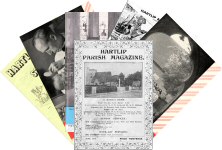
Hartlip Parish Magazine - on-line archive
September 1967 : page 8 (of 8)
A NATURALIST'S NOTEBOOK
Three calls of a completely different nature have prompted me to write the Notebook for this month. The first was a 'phone call from our friend and vicar, the Rev. John Green, who politely reminded me that my manuscript was due for the printers and that he would be calling in the morning for the completed article. To be perfectly honest, I am afraid that I had not put pen to paper, so I decided to be up at the break of dawn the next morning (5.00 a.m. at this time of year!) and complete the Notebook before milking the cows on the farm. As a Naturalist and Farmer, I have always thought that the dawn was the best part of the day, when the wild-life of the countryside can proceed with its own way of living without any disturbance from human, beings. This leads me to my second call - the wonderful "seven whistle" of the Whimbrel as seventeen of these lovely wading birds flew over my house at Stockbury, obviously on migration from their breeding grounds in the far north. This was a wonderful sight with the sun just appearing over the horizon, a full moon still very high in the North-West and the Whimbrel calling to their hearts content as they flew southwards, against an azure-blue sky. This proved a great distraction to my writing but, on the other hand, had I not been up to write the Notebook, it is more than likely that I would have missed the Whimbrel.
My third call was a distress one from a gentlman living on the main A.249 road by Stockbury Viaduct, who rang to inform me that he was very worried about a Shelduck and her family who were trying to cross the road without being run over by the traffic. On arrival I found that the Shelduck had managed to get six of her family across but four were still running about in the road. Fortunately all the traffic stopped and we managed to get all the remaining ducklings safely across. Most Shelduck nest on the coast close to salt water as it is hereditry for the duck to take her ducklings to salt water at a very early age, but a few pairs venture inland to nest in old rabbit burrows, (a pair used to nest annually in Queendown Warren but I have not seen them this year). After a few days the urge to reach salt water becomes predominant and these inland nesting Shelduck start off on their hazarodus journey to the coast. I always wonder how many survive, as our Stockbury and Hartlip Shelduck have to conquer the M.2 Motorway as well as the Railway.
W.F.A.B.